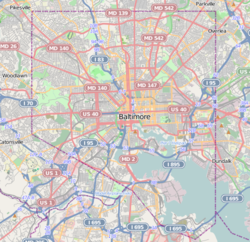South Central Avenue Historic District is a national historic district in Baltimore, Maryland, United States. It contains brick two- and three-story industrial and residential buildings reflecting over 150 years of utilitarian adaptation of buildings and space. The district includes early 19th century rowhouses, late 19th century and early 20th century manufacturing and warehouse buildings, gas stations, stables, car barns, commercial/residential buildings, and corner stores. Several larger buildings are the Bagby Furniture Company Building (4 stories), the Strauss Malt House (5 stories), and the Alameda School. Many rowhouses have been covered with formstone.[2]
South Central Avenue Historic District | |
 Malt house, May 2012 | |
| Location | Approx. 8 blocks centering Central Ave. Bet. Pratt and Fleet Sts., Baltimore, Maryland |
|---|---|
| Coordinates | 39°17′12″N 76°35′58″W / 39.28667°N 76.59944°W |
| Area | 21 acres (8.5 ha) |
| Architectural style | Mid 19th Century Revival, Late Victorian, et al. |
| NRHP reference No. | 01001213[1] |
| Added to NRHP | November 11, 2001 |
It was added to the National Register of Historic Places in 2001.[1]
References
edit- ^ a b "National Register Information System". National Register of Historic Places. National Park Service. July 9, 2010.
- ^ Betty Bird; Julie Darsie & Carolyn Eastman (January 2001). "National Register of Historic Places Registration: South Central Avenue Historic District" (PDF). Maryland Historical Trust. Retrieved 2016-04-01.
External links
edit- South Central Avenue Historic District, Baltimore City, including photo dated 2001, at Maryland Historical Trust
- Boundary Map of the South Central Avenue Historic District, Baltimore City, at Maryland Historical Trust


